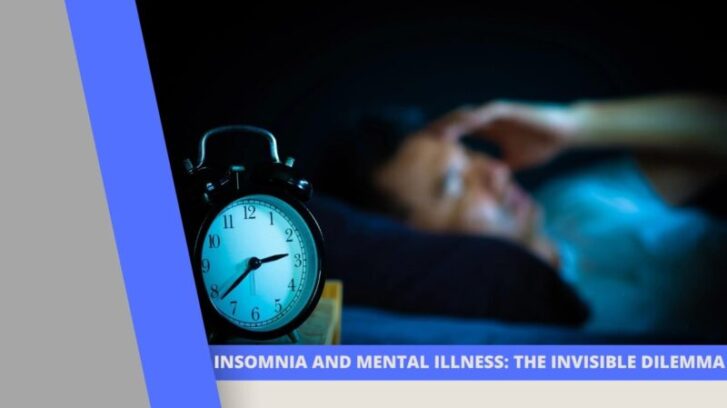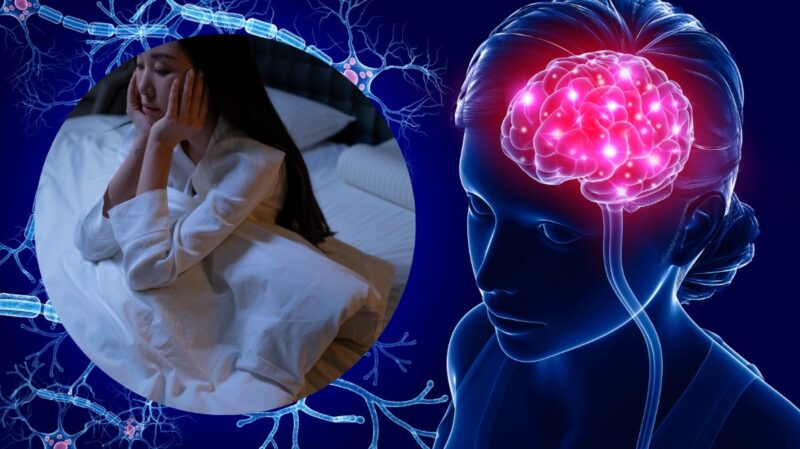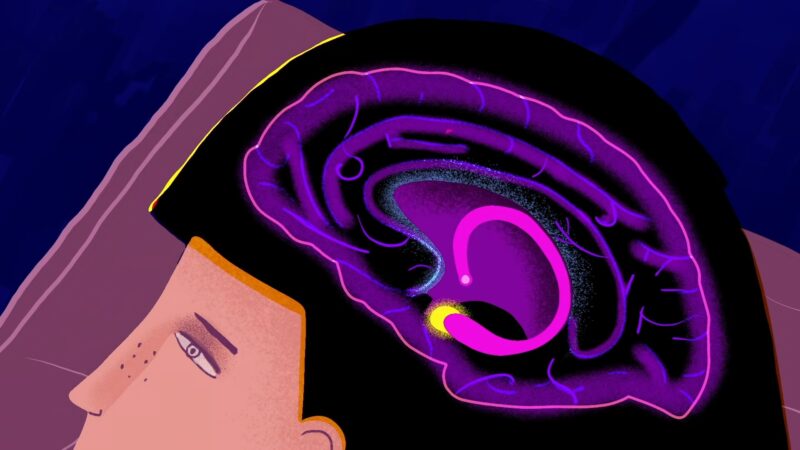In the hustle and bustle of modern life, sleep often takes a backseat, with many individuals facing the relentless grip of insomnia. Characterized by difficulty falling asleep, staying asleep, or waking up too early, is not just a minor inconvenience but a serious concern that can significantly impact mental health.
Mental illness, a broad term encompassing various conditions affecting emotional well-being, is closely intertwined with insomnia. The intricate relationship between these two entities goes beyond mere coincidence, as emerging research sheds light on the complex connections.
Understanding the interplay between insomnia and mental illness is crucial for effective diagnosis, treatment, and prevention strategies. In this article, we explore the prevalence, biological and psychological mechanisms, impact, diagnostic challenges, treatment approaches, and future directions in addressing to it.
Prevalence of Insomnia in Mental Illness
They often go hand in hand, forming a tangled web that can exacerbate symptoms and complicate treatment outcomes. Studies have revealed a high prevalence among individuals with mental illness.
According to the National Institute of Mental Health, around 40% of adults with insomnia also meet the criteria for a psychiatric disorder, such as depression, anxiety, bipolar disorder, or post-traumatic stress disorder (PTSD).
Moreover, individuals with insomnia are 10 times more likely to develop depression and 17 times more likely to develop anxiety disorders compared to those without. This staggering overlap emphasizes the need to address sleep disturbances as a crucial aspect of mental health care.
Various mental illnesses are commonly associated with it. Depression, for instance, often manifests with sleep disturbances, such as difficulty falling asleep or early morning awakenings. Anxiety disorders, characterized by excessive worrying and restlessness, can also disrupt sleep patterns.
Bipolar disorder, with its oscillating cycles of mania and depression, frequently leads to insomnia during manic episodes.
Additionally, conditions like PTSD and schizophrenia frequently co-occur with insomnia, further complicating the mental health landscape. Importantly, the presence can worsen the severity and prognosis of mental illness, leading to increased symptom burden and reduced quality of life.
Biological Mechanisms
To comprehend the relationship between insomnia and mental illness, it is crucial to delve into the underlying biological mechanisms. Disruptions in the sleep-wake cycle and circadian rhythm play a pivotal role in both conditions.
The sleep-wake cycle, regulated by a delicate balance of hormones and neurotransmitters, can become dysregulated, contributing to health disturbances. For instance, the sleep hormone melatonin, responsible for promoting sleep, may be diminished in individuals with insomnia, impairing their ability to fall asleep.
In conditions like depression, alterations in neurotransmitters such as serotonin and norepinephrine can affect sleep regulation, resulting in insomnia.
Furthermore, genetic factors are believed to contribute to the development of both. Studies have identified specific genes associated with sleep disorders and psychiatric conditions, suggesting a shared genetic vulnerability.
Variations in genes responsible for regulating circadian rhythms and neurotransmitter function can impact an individual’s susceptibility to both insomnia and mental illness. Understanding these genetic underpinnings is crucial for developing targeted treatments and personalized medicine approaches in the future.
Psychological Factors
While biological mechanisms provide insights into the relationship between them, psychological factors also play a significant role in this complex interplay. Stress, a pervasive factor in modern life, can significantly impact sleep quality and quantity.
Chronic stress activates the body’s stress response system, leading to hyperarousal, rumination, and intrusive thoughts that can disrupt sleep patterns. Additionally, anxiety, a common symptom of many mental illnesses, can contribute to it. The relentless cycle of worrying and racing thoughts can keep individuals awake at night, further exacerbating their psychological distress.
Moreover, the psychological symptoms associated with mental illness can directly contribute to it. Conditions such as depression often manifest with feelings of sadness, hopelessness, and lack of motivation, which can make it difficult to fall asleep or find restful sleep.
Similarly, conditions like PTSD can lead to nightmares and flashbacks, intensifying sleep disturbances. Maladaptive sleep patterns, such as irregular sleep schedules or excessive daytime napping, can further perpetuate the cycle of insomnia and mental health difficulties.
Understanding these psychological factors is essential for tailoring interventions that address the root causes of both insomnia and mental illness.
Impact of Insomnia on Mental Health
With its disruptive effects on sleep, can have a profound impact on mental health. The relationship between is bidirectional, with each condition exacerbating the other in a vicious cycle. Understanding the impact on mental health is crucial for recognizing the significance of addressing sleep disturbances in the context of mental health care.
One of the primary ways insomnia affects mental health is by exacerbating the symptoms of existing mental illnesses. Lack of quality sleep can amplify the emotional and cognitive symptoms of conditions such as depression and anxiety.
In individuals with depression, can lead to persistent feelings of fatigue, difficulty concentrating, and decreased motivation, making it even harder to engage in daily activities and seek treatment. Similarly, it can heighten anxiety symptoms, leading to increased worry, restlessness, and a heightened sense of threat.
The combination of insomnia and mental illness creates a vicious cycle where the symptoms of both conditions reinforce and intensify each other.
Also has a significant impact on cognitive functioning. Sleep plays a crucial role in memory consolidation and cognitive processes such as attention, concentration, and problem-solving. Sleep deprivation resulting from insomnia can impair these cognitive functions, leading to difficulties in daily functioning, reduced productivity, and diminished quality of life.
Individuals may experience difficulties in work or school performance, impaired decision-making abilities, and decreased overall cognitive performance. These cognitive impairments further contribute to the burden of mental illness, as they can hinder individuals’ ability to engage in therapy, manage their symptoms effectively, and maintain healthy relationships.
Perhaps one of the most concerning aspects of the impact of insomnia on mental health is the increased risk of suicide. Research has consistently shown a strong association between insomnia and suicidal ideation, attempts, and completed suicides. It can intensify feelings of hopelessness, despair, and emotional pain, which can push individuals toward considering self-harm as a means of escape.
Moreover, sleep deprivation caused can affect impulse control and judgment, further increasing the risk of self-harm. Recognizing the link between insomnia and suicide is crucial for implementing effective preventive measures and ensuring comprehensive mental health care.
Diagnostic Challenges
Diagnosing and treating insomnia in the context of mental illness presents several challenges due to the complex interplay between these conditions. The overlapping symptoms and bidirectional relationship make it crucial to conduct a comprehensive assessment to identify and address both insomnia and underlying mental health concerns.
One of the diagnostic challenges lies in the overlapping symptoms between insomnia and mental illness. Sleep disturbances, such as difficulty falling asleep or staying asleep, are symptoms shared by both conditions. This overlap can make it challenging to determine whether the sleep disturbances are a primary symptom or a secondary symptom resulting from the underlying mental illness.
It requires careful evaluation to determine the primary cause and develop an appropriate treatment plan. Collaborative efforts between mental health professionals and sleep specialists can greatly aid in the accurate diagnosis and management of these intertwined conditions.
Comprehensive assessment is essential to differentiate between primary and secondary. Primary ia refers to sleep difficulties that are not directly caused by another medical or mental health condition. It is often a diagnosis of exclusion, where other potential causes of sleep disturbances are ruled out.
On the other hand, secondary insomnia is a result of an underlying condition, such as depression, anxiety, or chronic pain. Identifying the underlying mental illness contributing is crucial for developing an effective treatment plan. It requires a multi-dimensional evaluation that considers the individual’s medical history, sleep patterns, psychological symptoms, and overall mental well-being.
In addition to comprehensive assessment, the use of validated assessment tools and sleep diaries can aid in the accurate diagnosis of insomnia and its association with mental illness. Sleep questionnaires, such as the Pittsburgh Sleep Quality Index (PSQI) and Insomnia Severity Index (ISI), can provide valuable information about sleep quality, duration, and associated daytime impairments.
These tools, combined with clinical interviews and objective measures like polysomnography or actigraphy, can help clinicians gain a comprehensive understanding of the individual’s sleep patterns and mental health status.
Treatment Approaches
Effectively managing the complex interplay between insomnia and mental illness requires a comprehensive approach that addresses both conditions simultaneously. Treatment approaches for mental illness encompass a range of interventions, including pharmacological options, cognitive-behavioral therapy for insomnia (CBT-I), and integrated treatment models.
Pharmacological interventions can be a useful component of treatment, particularly for individuals with severe insomnia or when other interventions have not yielded significant improvements. Medications such as benzodiazepines or non-benzodiazepine hypnotics may be prescribed to help regulate sleep and alleviate insomnia symptoms.
However, it is important to note that pharmacological interventions should be used judiciously, with careful consideration of potential side effects and the risk of dependence or addiction. Collaborative decision-making between healthcare professionals and individuals is crucial to weigh the benefits and risks of medication use and tailor treatment to individual needs.
Cognitive-behavioral therapy (CBT-I) is a highly effective non-pharmacological intervention that addresses the underlying causes and perpetuating factors of insomnia. CBT-I focuses on modifying maladaptive thoughts and behaviors related to sleep and building healthy sleep habits.
It typically involves components such as sleep hygiene education, stimulus control, sleep restriction, and cognitive restructuring. CBT-I empowers individuals to take an active role in managing their sleep and has been shown to improve sleep quality, reduce insomnia symptoms, and enhance overall mental well-being.
Incorporating CBT-I as a first-line treatment in individuals with mental illness can lead to significant improvements in both sleep and mental health outcomes.
Lifestyle Modifications
In addition to pharmacological and therapeutic interventions, lifestyle modifications play a crucial role in managing insomnia and promoting mental well-being. Implementing healthy habits and making positive changes in daily routines can significantly improve sleep quality and overall mental health.
One key aspect of lifestyle modification is practicing good sleep hygiene. Sleep hygiene refers to a set of practices and habits that promote healthy sleep. This includes maintaining a consistent sleep schedule by going to bed and waking up at the same time each day, creating a comfortable sleep environment that is dark, quiet, and cool, and avoiding stimulating activities, such as using electronic devices or consuming caffeine close to bedtime.
Establishing a relaxing bedtime routine, such as reading a book or taking a warm bath, can also signal the body that it is time to wind down and prepare for sleep. By adopting these sleep hygiene practices, individuals can create a conducive environment for restful sleep and improve their sleep quality.
Regular exercise is another lifestyle modification that can positively impact both sleep and mental health. Engaging in physical activity during the day helps to reduce stress, anxiety, and depressive symptoms, promoting overall well-being.
Exercise has been shown to improve sleep quality, decrease the time it takes to fall asleep, and increase the amount of deep sleep experienced during the night. Incorporating moderate-intensity aerobic activities, such as walking, jogging, or cycling, into daily routines can have significant benefits for sleep and mental health.
However, it is important to avoid exercising too close to bedtime, as it can have a stimulating effect and make it harder to fall asleep.
Conclusion
It is a form a complex and intertwined relationship, with each condition impacting the other in a bidirectional manner. The prevalence of insomnia in individuals with mental illness highlights the need for comprehensive assessment and targeted interventions.
Biological mechanisms, including disruptions in the sleep-wake cycle and genetic factors, contribute to the development and persistence of both insomnia and mental illness. Psychological factors such as stress and psychological symptoms of mental illness further exacerbate sleep disturbances.
The impact on mental health is significant, leading to the exacerbation of symptoms, cognitive impairments, and increased risk of suicide.
















